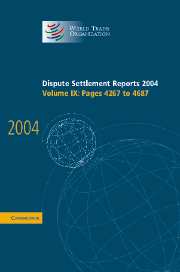Book contents
- Frontmatter
- Contents
- United States – Anti-Dumping Act of 1916 (Original Complaint by the European Communities) - Recourse to Arbitration by the United States under Article 22.6 of the DSU (WT/DS136) Decision by the Arbitrators
- European Communities – Conditions for the Granting of Tariff Preferences to Developing Countries - Arbitration under Article 21.3(c) of the DSU (WT/DS246) Award of the Arbitrator
- United States – Continued Dumping and Subsidy Offset Act of 2000 (Original Complaint by Brazil) - Recourse to Arbitration by the United States under Article 22.6 of the DSU (WT/DS217) Decision by the Arbitrator
- United States – Continued Dumping and Subsidy Offset Act of 2000 (Original Complaint by Canada) - Recourse to Arbitration by the United States under Article 22.6 of the DSU (WT/DS234) Decision by the Arbitrator
- United States – Continued Dumping and Subsidy Offset Act of 2000 (Original Complaint by Chile) - Recourse to Arbitration by the United States under Article 22.6 of the DSU (WT/DS217) Decision by the Arbitrator
- United States – Continued Dumping and Subsidy Offset Act of 2000 (Original Complaint by the European Communities) - Recourse to Arbitration by the United States under Article 22.6 of the DSU (WT/DS217) Decision by the Arbitrator
- Cumulative Index of Published Disputes
United States – Anti-Dumping Act of 1916 (Original Complaint by the European Communities) - Recourse to Arbitration by the United States under Article 22.6 of the DSU (WT/DS136) Decision by the Arbitrators
Published online by Cambridge University Press: 13 December 2017
- Frontmatter
- Contents
- United States – Anti-Dumping Act of 1916 (Original Complaint by the European Communities) - Recourse to Arbitration by the United States under Article 22.6 of the DSU (WT/DS136) Decision by the Arbitrators
- European Communities – Conditions for the Granting of Tariff Preferences to Developing Countries - Arbitration under Article 21.3(c) of the DSU (WT/DS246) Award of the Arbitrator
- United States – Continued Dumping and Subsidy Offset Act of 2000 (Original Complaint by Brazil) - Recourse to Arbitration by the United States under Article 22.6 of the DSU (WT/DS217) Decision by the Arbitrator
- United States – Continued Dumping and Subsidy Offset Act of 2000 (Original Complaint by Canada) - Recourse to Arbitration by the United States under Article 22.6 of the DSU (WT/DS234) Decision by the Arbitrator
- United States – Continued Dumping and Subsidy Offset Act of 2000 (Original Complaint by Chile) - Recourse to Arbitration by the United States under Article 22.6 of the DSU (WT/DS217) Decision by the Arbitrator
- United States – Continued Dumping and Subsidy Offset Act of 2000 (Original Complaint by the European Communities) - Recourse to Arbitration by the United States under Article 22.6 of the DSU (WT/DS217) Decision by the Arbitrator
- Cumulative Index of Published Disputes
Summary
INTRODUCTION
Request for Arbitration and Selection of the Arbitrators
On 26 September 2000, the Dispute Settlement Body (DSB) adopted the report of the Appellate Body and the report of the Panel as upheld by the Appellate Body in this dispute. The reasonable period of time for the United States to bring the Anti-Dumping Act of 1916 into conformity with the DSB recommendations and rulings was originally decided through arbitration pursuant to Article 21.3(c) of the Dispute Settlement Understanding (DSU), and was due to expire on 26 July 2001. It was subsequently extended so as to expire on 31 December 2001, or the date on which the then session of the US Congress adjourned, whichever would be earlier.
On 7 January 2002, the European Communities requested that the DSB authorize it to suspend the application of obligations under GATT 1994 and the Agreement on Implementation of Article VI of the General Agreement on Tariffs and Trade 1994 (the “Anti-Dumping Agreement”).
On 17 January 2002, the United States objected to the level of suspension proposed by the European Communities, pursuant to Article 22.6 of the DSU.
The matter was referred to arbitration. On 19 February 2002, Members were informed of the constitution of the Arbitrator. Its composition was as follows:
Chairman: Mr Dimitrij Grčar
Members: Mr Brendan McGivern
Mr Eugeniusz Piontek
On 27 February 2002, however, the European Communities and the United States jointly informed the Arbitrators that a proposal to repeal the 1916 Anti-Dumping Act and to terminate cases pending under the Act was being examined by the US Congress. In the light of this, the European Communities and the United States requested the Arbitrators to suspend the arbitration proceeding. The communication to the Arbitrators also stated that the European Communities and the United States agreed that the arbitration could be reactivated at the request of either party after 30 June 2002.
On 19 September 2003, the European Communities requested the reactivation of the arbitration proceedings.
- Type
- Chapter
- Information
- Dispute Settlement Reports 2004 , pp. 4269 - 4312Publisher: Cambridge University PressPrint publication year: 2006



